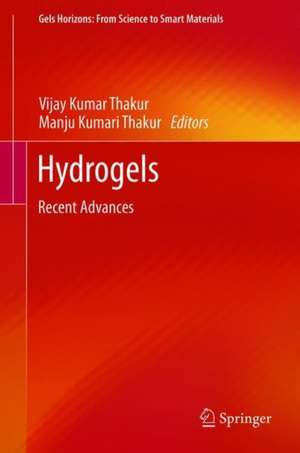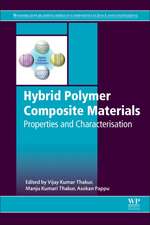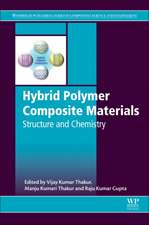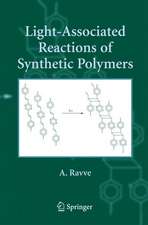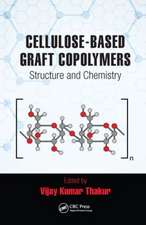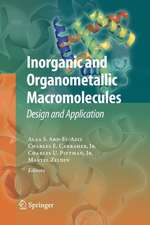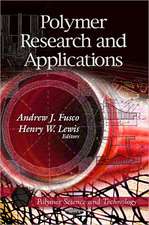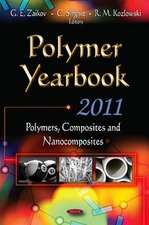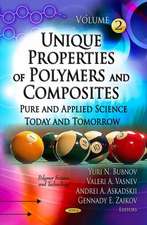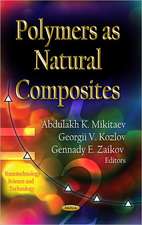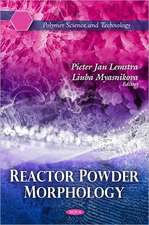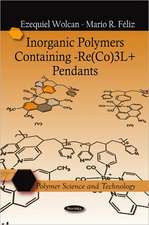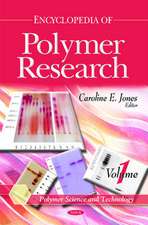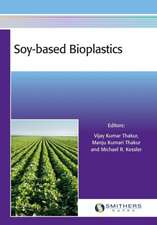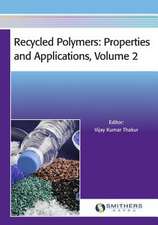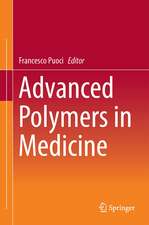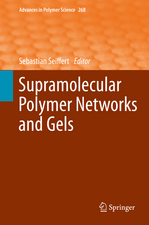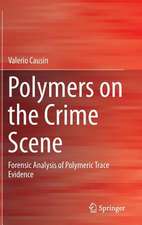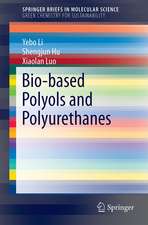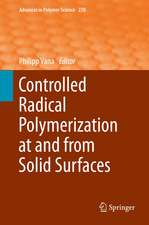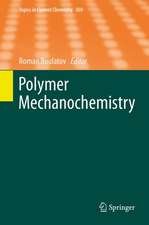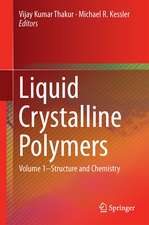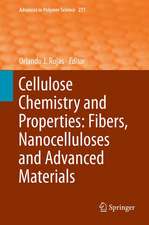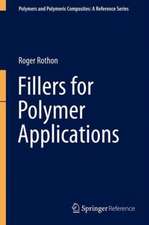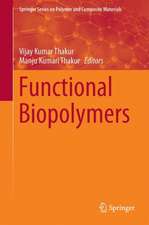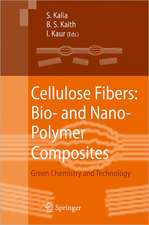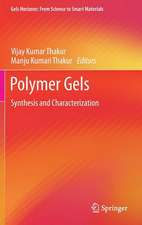Hydrogels: Recent Advances: Gels Horizons: From Science to Smart Materials
Editat de Vijay Kumar Thakur, Manju Kumari Thakuren Limba Engleză Hardback – 5 sep 2018
| Toate formatele și edițiile | Preț | Express |
|---|---|---|
| Paperback (1) | 1116.57 lei 6-8 săpt. | |
| Springer Nature Singapore – 2 feb 2019 | 1116.57 lei 6-8 săpt. | |
| Hardback (1) | 1122.87 lei 6-8 săpt. | |
| Springer Nature Singapore – 5 sep 2018 | 1122.87 lei 6-8 săpt. |
Preț: 1122.87 lei
Preț vechi: 1369.36 lei
-18% Nou
Puncte Express: 1684
Preț estimativ în valută:
214.89€ • 223.52$ • 177.40£
214.89€ • 223.52$ • 177.40£
Carte tipărită la comandă
Livrare economică 14-28 aprilie
Preluare comenzi: 021 569.72.76
Specificații
ISBN-13: 9789811060762
ISBN-10: 9811060762
Pagini: 600
Ilustrații: X, 470 p. 171 illus., 127 illus. in color.
Dimensiuni: 155 x 235 mm
Greutate: 0.85 kg
Ediția:1st ed. 2018
Editura: Springer Nature Singapore
Colecția Springer
Seria Gels Horizons: From Science to Smart Materials
Locul publicării:Singapore, Singapore
ISBN-10: 9811060762
Pagini: 600
Ilustrații: X, 470 p. 171 illus., 127 illus. in color.
Dimensiuni: 155 x 235 mm
Greutate: 0.85 kg
Ediția:1st ed. 2018
Editura: Springer Nature Singapore
Colecția Springer
Seria Gels Horizons: From Science to Smart Materials
Locul publicării:Singapore, Singapore
Cuprins
Intelligent Hydrogels For Controlled Drug Delivery.- Hydrogels From Catechol-Conjugated Polymeric Materials.- Super Absorbent Polymer Hydrogels.- Hydrogel-Based Strategies For Stem Cell Therapy.- Protein And Nanoparticle Loaded Hydrogels Studied By Small Angle Scattering And Rheology Techniques.- Preparation, Properties And Applications Of Hydrogels: A Review.- Hydrogel–Based Stimuli-Responsive Functionalized Graft Copolymers For The Controlled Delivery Of 5-Fluorouracil , An Anticancer Drug.- Emerging Technology In Medical Applications Of Hydrogel.- Electro Spinning Of Hydrogels For Biomedical Applications.- Polyvinyl Alcohol Hydrogels: Tunable Scaffolds For Tissue Engineering.- Cellulose Hydrogels As Sustainable Materials Regenerated From Waste.- Injectable Hydrogels For Cartilage Regeneration.- Poly (Vinyl Alcohol)/Polysaccharides Hydrogel Materials For Wound Healing And Waste Water Treatment.- Hydrogels : Synthesis Characterization And Applications.- Radiation- And Sonochemical Synthesis Of Nano-, Micro- And Macroscopic Hydrogels.- Dna Based Hydrogels: An Approach For Multifunctional Bio-Applications.- Stimuli-Responsive Hydrogel Film Changing In Adsorption-Desorption Of Nanoparticles Reversibly.- Various Functional And Stimuli-Responsive Hydrogel Based On Polyaspartamides.- Interpenetrating-Polymer-Network Hydrogels: Smart Materials For Biomedical Applications.
Notă biografică
Dr. Vijay Kumar Thakur is currently a Permanent Faculty in the School of Aerospace, Transport and Manufacturing , Cranfield University, UK. Some of his other prior significant appointments include being a Research Scientist in Temasek Laboratories at Nanyang Technological University, Singapore (2009-2012) and a Visiting Research Fellow in the Department of Chemical and Materials Engineering at LHU–Taiwan. He spent his postdoctoral study in Materials Science & Engineering at Iowa State University, USA and received Ph.D. in Polymer Chemistry (2009). In the course of his academic career, he has published more than 100 SCI journal research articles in the field of chemical sciences/materials science and holds one US patent. Among these, ten of his research papers have been highlighted as “Highly Cited Papers” in Web of Science (less than 1% of published papers receive this ranking), while three others have been highlighted as “Hot Papers” (Hot papers are selected
by virtue of being cited among the top one-tenth of one percent-0.1%) in a current bimonthly period in Web of Science). He has also published 33 books and 35 book chapters on the advanced state-of-the-art of polymer science/materials science/nanotechnology with numerous publishers. His research interests include the synthesis and processing of bio-based polymers, composites, nanostructured materials, hydrogels, polymer micro/nanocomposites, nanoelectronic materials, novel high dielectric constant materials, engineering nanomaterials, electrochromic materials, green synthesis of nanomaterials, and surface functionalization of polymers/nanomaterials. He sits on the editorial board of several SCI journals as well as Scientific Bodies around the globe.Dr. Manju Kumari Thakur has been working as an assistant professor of Chemistry at the Division of Chemistry, Himachal Pradesh University, Shimla, India since June 2010. She received her B.Sc. in Chemistry, Botany andZoology; M.Sc., M. Phil in Organic Chemistry and Ph.D. in Polymer Chemistry from the Chemistry Department at Himachal Pradesh University, Shimla, INDIA. She has broad experience in the field of organic chemistry, biopolymers, composites/nanocomposites, hydrogels, applications of hydrogels in the removal of toxic heavy metal ions, drug delivery, etc. She has published more than 30 research papers in several international journals, has co-authored three books, and has also published 25 book chapters in the field of polymeric materials.
by virtue of being cited among the top one-tenth of one percent-0.1%) in a current bimonthly period in Web of Science). He has also published 33 books and 35 book chapters on the advanced state-of-the-art of polymer science/materials science/nanotechnology with numerous publishers. His research interests include the synthesis and processing of bio-based polymers, composites, nanostructured materials, hydrogels, polymer micro/nanocomposites, nanoelectronic materials, novel high dielectric constant materials, engineering nanomaterials, electrochromic materials, green synthesis of nanomaterials, and surface functionalization of polymers/nanomaterials. He sits on the editorial board of several SCI journals as well as Scientific Bodies around the globe.Dr. Manju Kumari Thakur has been working as an assistant professor of Chemistry at the Division of Chemistry, Himachal Pradesh University, Shimla, India since June 2010. She received her B.Sc. in Chemistry, Botany andZoology; M.Sc., M. Phil in Organic Chemistry and Ph.D. in Polymer Chemistry from the Chemistry Department at Himachal Pradesh University, Shimla, INDIA. She has broad experience in the field of organic chemistry, biopolymers, composites/nanocomposites, hydrogels, applications of hydrogels in the removal of toxic heavy metal ions, drug delivery, etc. She has published more than 30 research papers in several international journals, has co-authored three books, and has also published 25 book chapters in the field of polymeric materials.
Textul de pe ultima copertă
This book discusses recent advances in hydrogels, including their generation and applications and presents a compendium of fundamental concepts. It highlights the most important hydrogel materials, including physical hydrogels, chemical hydrogels, and nanohydrogels and explores the development of hydrogel-based novel materials that respond to external stimuli, such as temperature, pressure, pH, light, biochemicals or magnetism, which represent a new class of intelligent materials. With their multiple cooperative functions, hydrogel-based materials exhibit different potential applications ranging from biomedical engineering to water purification systems. This book covers key topics including superabsorbent polymer hydrogel; intelligent hydrogels for drug delivery; hydrogels from catechol-conjugated materials; nanomaterials loaded hydrogel; electrospinning of hydrogels; biopolymers-based hydrogels; injectable hydrogels; interpenetrating-polymer-network hydrogels: radiation- and sonochemical synthesis of micro/nano/macroscopic hydrogels; DNA-based hydrogels; and multifunctional applications of hydrogels. It will prove a valuable resource for researchers working in industry and academia alike.
Caracteristici
Discusses the recent advances in hydrogels useful for different applications Presents an important compendium of fundamental concepts and recent advances in hydrogels Provides the readers with the necessary knowledge of the different physical and chemical hydrogel formation mechanisms Highlights the most important hydrogel materials, including physical hydrogels, chemical hydrogels, and nanohydrogels
